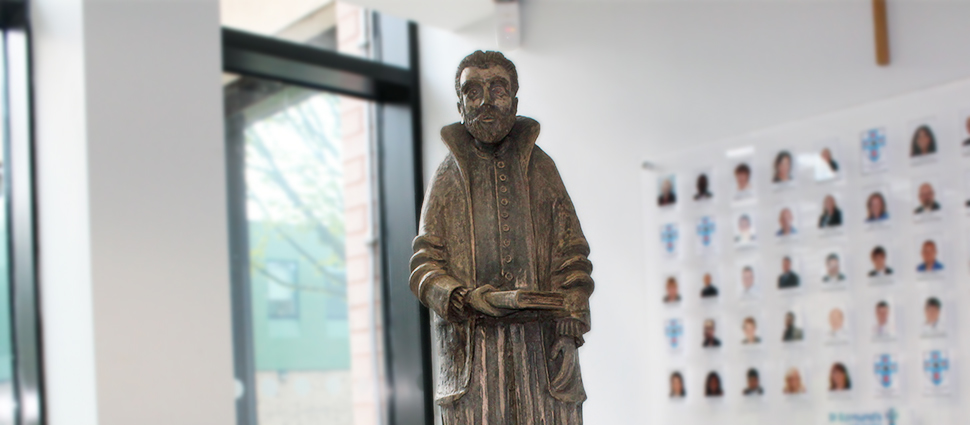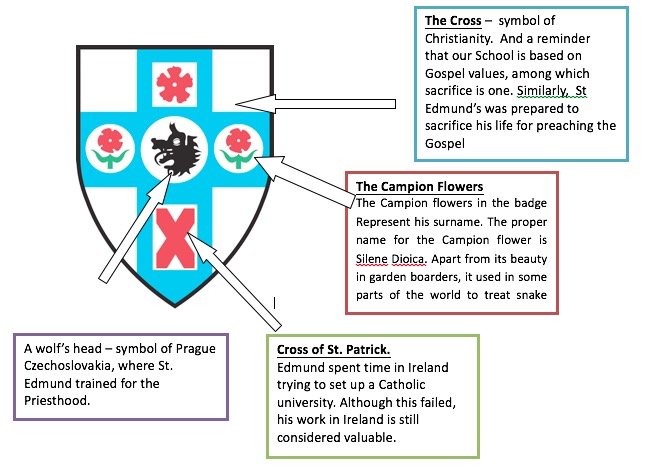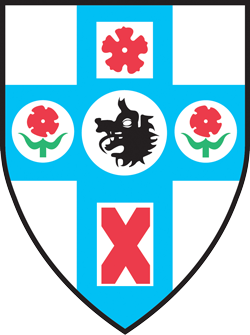
Edmund Campion was born in 1540, the son of a bookseller in Paternoster row, just behind St Paul’s Cathedral in London.He grew up amid the religious upheavals of the sixteenth century following the break between Henry VIII and Rome.
Campion went to the local grammar school and then, age 12, to the new Christ’s Hospital school for orphans and the poor. In August 1553, he was chosen to make a ceremonial address to Queen Mary as she passed through London. Campion was able academically and went to St John’s College, Oxford, at the age of 15 (which was not unusual in those days). He was awarded his degree in 1564 and became a Fellow of the University. In 1566, he was again chosen to make a formal speech of welcome before the new Queen, Elizabeth I, when she visited Oxford. Much impressed with Campion, Elizabeth ensured he had friends and patrons at Court.
Campion was ordained a deacon in the Anglican Church.
Increasingly Campion came to believe that the Protestant church was not the true continuation of the Christian faith and that only in the Catholic church would he find a home. He resigned his position at Oxford.
Campion went to Dublin in 1570 and was involved in the establishment of a university there.
With the excommunication of Elizabeth I by Pope Pius V in 1570, everything became much more difficult for Catholics and people like Campion who were unsure of their religious allegiance.
Campion became a Catholic and went to the new seminary for English Catholics founded at Douai in France. He was ordained subdeacon and then walked, barefoot, to Rome to become a Jesuit in April 1573. Campion pursued his studies as a Jesuit and taught in the Jesuit College in Prague. He was ordained priest in 1578.
Campion was persuaded, against his better judgement, to join the new mission to England. On 16th June 1580, Fr Robert Persons SJ landed at Dover, the Superior of the new mission. On 24th June, Campion followed, disguised as a jewel merchant. Campion moved between the houses of Catholics (the Recusants) who practised their religion in secret. At one such house, Lyford Grange in Oxfordshire, he was betrayed and arrested on 17th July 1581, barely a year after he had set foot in England.
He was imprisoned and tortured in the Tower of London and tried at Westminster Hall in November 1581. Condemned for treason, he was dragged on a hurdle to Tyburn where he was martyred with Fr Alexander Briant SJ and Fr Ralph Sherwin. He was hanged and then, before he was dead, his genitals cut off, his entrails ripped out and burned before him, his head hacked off and his body quartered.
The Feast Day of St Edmund Campion is celebrated on 1st December. With him are celebrated his fellow martyr St Alexander Briant SJ, and St Robert Southwell SJ who was martyred on 21st February 1595. All were made saints by Pope Paul VI in 1970 along with 37 others (the Forty Martyrs of England and Wales).
Source: The Jesuit Institute.


